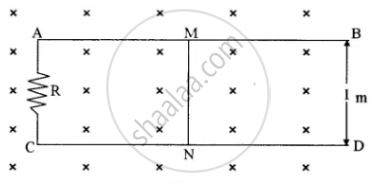Advertisements
Advertisements
Question
Why should electrostatic field be zero inside a conductor?
Solution
Charge on conductor resides on its surface. So if we consider a Gaussian surface inside the conductor to find the electrostatic field,
`phi = q/epsi_0`Where, q = charge enclosed in Gaussian surface.
q = 0, inside the conductor, hence the electrostatic field inside the conductor is zero.
`phi = oint vecE.dvecs = q/epsi_0`
`oint Eds cos theta = q/epsi_0`
`=> E = q/(4pi epsi_0r)` = (Since q = 0)
APPEARS IN
RELATED QUESTIONS
Define mobility of a charge carrier
Two charged spherical conductors of radii R1 and R2 when connected by a conducting wire acquire charges q1 and q2 respectively. Find the ratio of their surface charge densities in terms of their radii.
Draw a plot of potential energy between a pair of nucleons as a function of their separation. Mark the regions where potential energy is (i) positive and (ii) negative.
Draw a plot of potential energy of a pair of nucleons as a function of their separation.
what is the significance of negative potential energy in the graph drawn?
AB and CD are two parallel conductors kept 1 m apart and connected by a resistance R of 6 Ω as shown in Figure below. They are placed in a magnetic field B = 3 × 10-2 T which is perpendicular to the plane of the conductors and directed into the paper. A Wire. MN is placed over AB and CD. and then made to slide with a velocity 2 ms-1 (Neglect the resistance of AB, CD, and MN.)

Calculate the induced c.urrent flowing through the resistor R.
A long, hollow conducting cylinder is kept coaxially inside another long, hollow conducting cylinder of larger radius. Both the cylinders are initially electrically neutral ______.
Two spherical conductors each of capacity C are charged to potential V and -V. These are then connected by means of a fine wire. The loss of energy is ______.
A 4µF condenser is charged to 400 volts and then plates are joined through a resistance of 1 kΩ The heat produced in the resistance is:
A conductor has a 14.4 × 10-19 coulomb positive charge. The conductor has ______
(Charge on electron = 1.6 × 10-19 coulomb)
